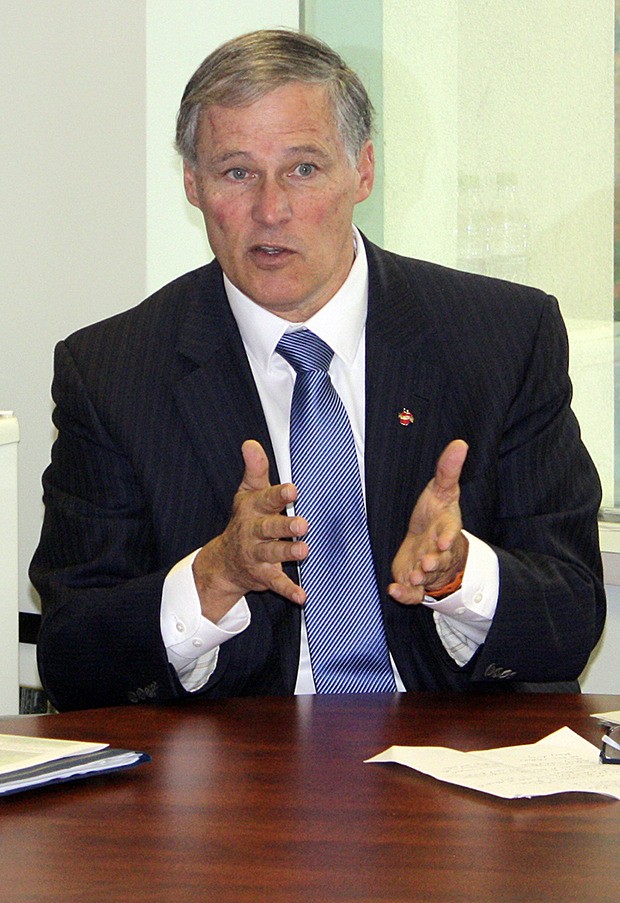By Brandon Macz
Reporter Newspapers
Before an Apple Cup champion emerges, Gov. Jay Inslee says he wants to see an approved transportation bill on his desk crafted through a bipartisan effort and identifying $10 billion in revenue sources needed to keep the state’s roads and bridges from failing.
“November is the month for action here,” Inslee told a room full of Sound Publishing editors and reporters on Friday. “Actually, April and May were the months.”
The governor said he is disappointed the Senate was unable to come up with a transportation bill after six months while the House passed its legislation. Senate Republicans opted not to approve the House bill in favor of launching a listening tour in Washington to find ways to find savings through reforms before pushing for tax increases.
Inslee said there is a need for reform, which is already occurring within the Washington State Department of Transportation with the appointment of Lynn Peterson as head of the agency, as well as making improvements to permitting processes, cutting fat from projects, streamlining maintenance and leaner management of the transportation department.
Peterson also attended the Sound Publishing meeting.
What the state doesn’t need, said the governor, is to channel sales tax revenue from the general fund to the transportation fund, as has been proposed by Republican lawmakers, or removing sales tax from transportation projects entirely. That would mean stripping more money from education, Inslee said, which is a step backward in fulfilling the Washington Supreme Court’s ruling the state needs to invest $3 billion-4 billion more into education.
“The first order of business is, don’t dig the hole any deeper, another $400 million deeper like some have suggested,” Inslee said. “There are people in one of the caucuses who suggested that let’s just dig that hole another $400 million deeper and take that money from the general fund that’s generated by sales tax from construction projects and move that money into the transportation fund. … It’s a scientific principle, once you are in the hole, stop digging.”
Closing tax loopholes
While the governor said there are various avenues for approving a transportation plan and closing its funding gap, he doesn’t want to prejudge how the House and Senate will reach its final destination. Closing tax loopholes would be one method of cost savings that could alleviate some of the burden for Washington residents, said Inslee, using as an example a tax exemption approved for the timber industry that oil and gas companies also are utilizing.
The governor painted a bleak picture for the state should a transportation plan not be approved before the Nov. 29 Apple Cup, which occurs again on Black Friday next month. In King County, public transportation would be affected first.
“The first thing that’s going to hit them between the eyes,” Inslee said, “is the elimination of bus service, and that has an economic toll on our state. It makes it more frustrating to get to work in the morning, but it also takes an economic toll on our state. That means companies don’t move here because congestion increases. It means that workers are stuck in traffic, so they show up to work later because they used to be able to take a reliable bus to work. Now, they’re waiting in their car sitting in a traffic jam waiting to get to Microsoft. It takes economic productivity out of the state.”
Toils with tolling
Inslee said he understands the frustration of King County residents facing potential tolling of the I-90 bridge between Interstate 5 in Seattle and Interstate 405 in Bellevue to make up the $1.4 billion shortfall for completion of the State Route 520 bridge project. He added the collapse of the I-5 bridge over the Skagit River earlier this year highlights the importance of proper maintenance.
Tolling I-90 is not a certainty, and there are several options being considered, including 11 alternatives that would mitigate the impact to Mercer Islanders. Increasing the state gas tax is also a possibility. Inslee said he encourages Mercer Island residents to contact their state representatives.
“They need to talk to their legislators now about this issue,” he said. “And here’s the reason: The more they convince legislators to find a solution that is not tolling, the better off they are. The more they convince their legislators to raise the $1.4 billion for 520 in some other way, which might mean a gas tax, it might mean licensing fees, whatever their other solution is, the less pressure there will be on tolling.”
Brandon Macz is a staff writer at the Bellevue Reporter. He can be contacted at 425-453-4602 or bmacz@bellevuereporter.com.
Talk to us
Please share your story tips by emailing editor@kentreporter.com.
To share your opinion for publication, submit a letter through our website https://www.kentreporter.com/submit-letter/. Include your name, address and daytime phone number. (We’ll only publish your name and hometown.) Please keep letters to 300 words or less.

